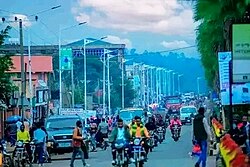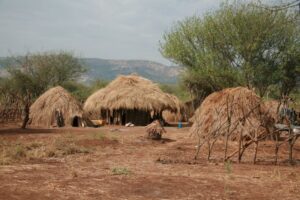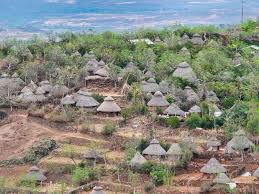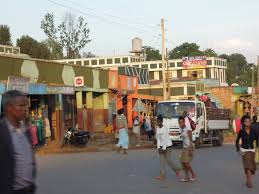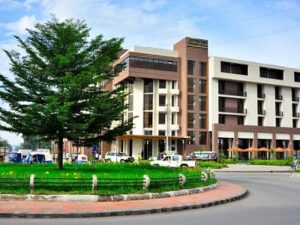Areka is a charming town located in the Wolayta Zone of South Ethiopia Regional State. Known for its deep cultural roots, agricultural significance, and steady development, Areka stands out as a vibrant center in southern Ethiopia. The town offers a unique blend of tradition and modern progress, with its rich cultural heritage and growing infrastructure making it a town worth exploring.
Geographic and Historical Overview
Areka is situated at an elevation of around 1,772 meters above sea level, which gives it a cool and temperate climate, ideal for agriculture and outdoor activities. Located about 300 kilometers from Addis Ababa and 50 kilometers from Wolaita Sodo, Areka is an accessible town that serves as a gateway to the Wolayta region’s cultural and economic activities.
Historically, Areka has been closely tied to the Wolayta people, an ethnic group known for its long-standing agricultural traditions and vibrant cultural expressions. Over the years, Areka has evolved from a small agricultural town into a growing urban center, maintaining its cultural heritage while embracing modern development.
The People and Culture of Areka

Areka is predominantly home to the Wolayta people, one of the largest ethnic groups in Southern Ethiopia. The Wolayta people are known for their strong connection to their land and agricultural expertise, particularly in the cultivation of crops such as enset (false banana), maize, and teff. These crops play a vital role in the local economy and are central to the community’s way of life.
The Wolayta people are also known for their vibrant cultural practices, including traditional music, dance, and festivals. Visitors to Areka can witness the Timket Festival (Epiphany) and other local celebrations, where traditional attire, rhythmic Wolayta dances, and songs are performed, showcasing the town’s rich cultural heritage. The strong sense of community in Areka is evident during these celebrations, where the town’s residents come together to share in their customs and traditions.
Economic Importance of Areka
Agriculture is the backbone of Areka’s economy. The town is located in a fertile region with favorable conditions for growing a wide variety of crops. Enset, a staple food in the region, along with coffee, maize, and vegetables, are widely cultivated in the area. The surrounding agricultural land is well-managed, with many smallholder farms producing enough food for both local consumption and market trade.
One of the notable aspects of Areka’s economy is the Areka Agricultural Research Center, which focuses on improving agricultural practices and crop yields in the region. This research center plays a significant role in advancing sustainable farming methods, helping local farmers enhance their productivity and supporting the town’s economic growth.
Development and Infrastructure in Areka
In recent years, Areka has seen improvements in its infrastructure. The town now has better road connections, making travel between Areka and other major cities like Wolaita Sodo and Addis Ababa easier. The local government has also invested in healthcare and educational facilities, ensuring that residents have access to essential services.
Areka Agricultural Research Center, in particular, is a key driver of development in the area. It supports local farmers with research and education on better farming techniques, which not only boosts agricultural productivity but also helps safeguard the environment through sustainable practices. These developments are helping to modernize Areka while preserving its agricultural heritage.
Tourism Potential
While Areka may not be as widely known as other Ethiopian towns, it holds great potential for tourism, particularly for those interested in agro-tourism and cultural tourism. Visitors can explore the town’s vibrant markets, sample locally grown crops, and experience the traditional ways of life of the Wolayta people.
The surrounding landscapes, with their rolling hills and farmlands, provide a picturesque backdrop for nature lovers and hikers. The town is also relatively close to Lake Abaya, one of Ethiopia’s largest lakes, and Mount Damota, offering additional opportunities for eco-tourism and outdoor activities.
Education and the Future of Areka
Areka is home to several schools and educational institutions that play a key role in preparing the next generation for the future. The town’s educational facilities are growing, with both public and private schools offering education to local children. Additionally, the Areka Agricultural Research Center serves as a hub for knowledge and innovation, particularly in the field of sustainable agriculture.
The town’s commitment to education is evident in the increasing number of students attending local schools and the community’s efforts to ensure that education remains a priority. This focus on education, coupled with the town’s economic growth, is helping Areka build a brighter future.
Conclusion
Areka is a town where tradition meets progress. With its strong cultural heritage, vibrant agricultural sector, and growing infrastructure, Areka is poised for continued growth and development. Whether you’re interested in exploring the traditions of the Wolayta people, learning about sustainable farming practices, or simply enjoying the scenic beauty of southern Ethiopia, Areka has something to offer.
As the town continues to modernize, it remains deeply connected to its roots, making it a unique and inviting destination for both visitors and locals alike.

